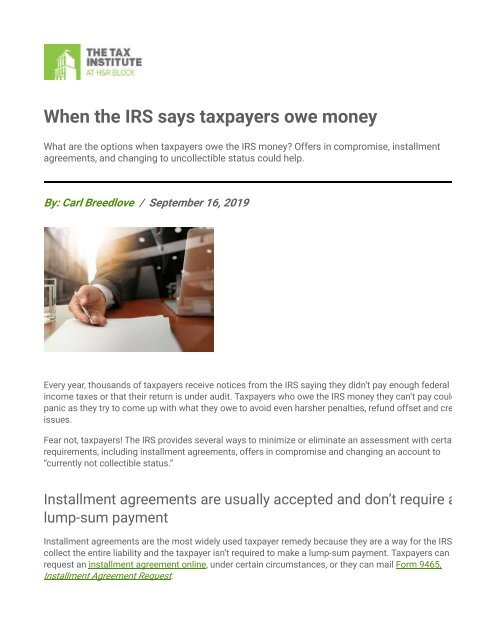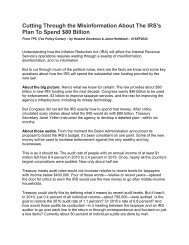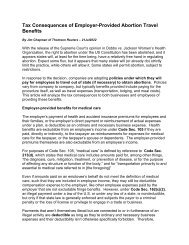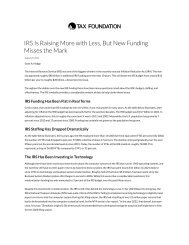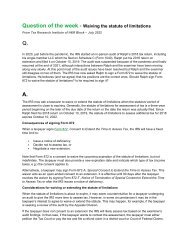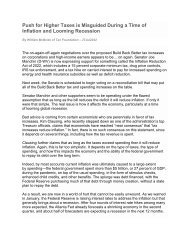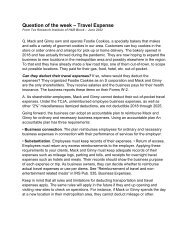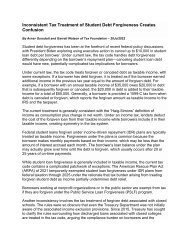When the IRS says taxpayers owe money
You also want an ePaper? Increase the reach of your titles
YUMPU automatically turns print PDFs into web optimized ePapers that Google loves.
<strong>When</strong> <strong>the</strong> <strong>IRS</strong> <strong>says</strong> <strong>taxpayers</strong> <strong>owe</strong> <strong>money</strong><br />
What are <strong>the</strong> options when <strong>taxpayers</strong> <strong>owe</strong> <strong>the</strong> <strong>IRS</strong> <strong>money</strong>? Offers in compromise, installment<br />
agreements, and changing to uncollectible status could help.<br />
By: Carl Breedlove / September 16, 2019<br />
Every year, thousands of <strong>taxpayers</strong> receive notices from <strong>the</strong> <strong>IRS</strong> saying <strong>the</strong>y didn’t pay enough federal<br />
income taxes or that <strong>the</strong>ir return is under audit. Taxpayers who <strong>owe</strong> <strong>the</strong> <strong>IRS</strong> <strong>money</strong> <strong>the</strong>y can’t pay could<br />
panic as <strong>the</strong>y try to come up with what <strong>the</strong>y <strong>owe</strong> to avoid even harsher penalties, refund offset and credit<br />
issues.<br />
Fear not, <strong>taxpayers</strong>! The <strong>IRS</strong> provides several ways to minimize or eliminate an assessment with certain<br />
requirements, including installment agreements, offers in compromise and changing an account to<br />
“currently not collectible status.”<br />
Installment agreements are usually accepted and don’t require a<br />
lump-sum payment<br />
Installment agreements are <strong>the</strong> most widely used taxpayer remedy because <strong>the</strong>y are a way for <strong>the</strong> <strong>IRS</strong> to<br />
collect <strong>the</strong> entire liability and <strong>the</strong> taxpayer isn’t required to make a lump-sum payment. Taxpayers can<br />
request an installment agreement online, under certain circumstances, or <strong>the</strong>y can mail Form 9465,<br />
Installment Agreement Request.
To submit a request online, <strong>taxpayers</strong> must complete an Online Payment Agreement (OPA). For<br />
individuals, <strong>the</strong> total tax liability, penalties and interest must be $50,000 or less. If <strong>the</strong> total liability is<br />
greater than $50,000, <strong>the</strong> taxpayer must mail Form 9465 along with a completed Form 433-F, Collection<br />
Information Statement, that lays out <strong>the</strong> taxpayer’s nancial situation. If a taxpayer does not abide by <strong>the</strong><br />
installment agreement, <strong>the</strong> <strong>IRS</strong> will consider it a default on <strong>the</strong> installment agreement and may revoke it.<br />
Once a taxpayer defaults on <strong>the</strong> installment agreement, <strong>the</strong> <strong>IRS</strong> will send a CP523 Notice giving <strong>the</strong><br />
taxpayer a chance to make any payments and contact <strong>the</strong> <strong>IRS</strong> before a specied termination date. If <strong>the</strong><br />
taxpayer ignores <strong>the</strong> notice, <strong>the</strong> <strong>IRS</strong> will terminate <strong>the</strong> installment agreement, and <strong>the</strong> <strong>IRS</strong> will proceed<br />
with collection actions such as levying wages and bank accounts.<br />
Streamlined agreements don’t require nancial statements and are generally approved<br />
faster than o<strong>the</strong>rs<br />
Streamlined agreements don’t require nancial statements or managerial approval which means <strong>the</strong>y<br />
tend to get approved faster. The payment duration of a streamlined agreement cannot exceed 72 months<br />
(six years) or <strong>the</strong>y must be completed prior to <strong>the</strong> collection statute of limitations expiration date<br />
(normally 10 years from <strong>the</strong> assessment date), whichever is earlier. To qualify, <strong>taxpayers</strong> must <strong>owe</strong><br />
$50,000 or less, but <strong>the</strong>y can pay down <strong>the</strong>ir liability and <strong>the</strong>n qualify. If <strong>the</strong> taxpayer <strong>owe</strong>s between<br />
$25,001 and $50,000 <strong>the</strong>y must enroll in ei<strong>the</strong>r a direct debit installment agreement or a payroll deduction<br />
agreement (Form 2159, Payroll Deduction Agreement) and some nancial information may be required.<br />
Example 1: John <strong>owe</strong>s $20,000 in back taxes. He has a good job and <strong>the</strong> ability to pay off <strong>the</strong> debt<br />
over time. John les Form 9465 requesting an agreement that allows him to pay $278 per month<br />
until <strong>the</strong> debt is paid off. This agreement will likely be accepted because his monthly payment is<br />
large enough to pay off <strong>the</strong> debt within <strong>the</strong> 72-month time-period. If John had asked to make<br />
payments of only $200 <strong>the</strong> agreement likely would not be accepted because it would take 100<br />
months to eliminate <strong>the</strong> debt.<br />
Guaranteed agreements are automatically approved if certain requirements are met<br />
An installment agreement is automatically approved when:<br />
1. The amount of <strong>the</strong> tax (excluding interest, penalties, additions to <strong>the</strong> tax, and additional amounts)<br />
does not exceed $10,000;<br />
2. The taxpayer has led all previous tax returns and paid any tax required (o<strong>the</strong>r than for <strong>the</strong> year an<br />
installment is requested), and hasn’t entered into an installment agreement for <strong>the</strong> last ve years;<br />
3. The <strong>IRS</strong> determines that <strong>the</strong> taxpayer is nancially unable to pay <strong>the</strong> tax in full based upon<br />
information provided by <strong>the</strong> taxpayer;<br />
4. The agreement will result in full payment of <strong>the</strong> tax within 36 months (three years); and<br />
5. The taxpayer agrees to le and pay all tax returns during <strong>the</strong> term of <strong>the</strong> agreement.<br />
Guaranteed agreements allow <strong>taxpayers</strong> some certainty that an agreement will be approved, if <strong>the</strong>y meet<br />
all <strong>the</strong> requirements. Note that <strong>the</strong> dollar limit for guaranteed agreements of $10,000 only applies to tax,<br />
not to penalties, interest, etc.
Although installment agreements are <strong>the</strong> most common remedy used, sometimes <strong>taxpayers</strong> cannot<br />
afford to pay <strong>the</strong> debt in full. That’s where offers in compromise and changing an account to not<br />
collectible status come in.<br />
Offers in compromise settle tax liabilities for less than <strong>the</strong> full<br />
amount <strong>owe</strong>d<br />
In situations where an installment agreement is too onerous for a taxpayer to pay, an offer in compromise<br />
(OIC) may be <strong>the</strong> best option. An OIC is an agreement between a taxpayer and <strong>the</strong> <strong>IRS</strong> that settles a tax<br />
liability for less than <strong>the</strong> full amount <strong>owe</strong>d. The <strong>IRS</strong> will evaluate <strong>the</strong> taxpayer’s specic situation based on<br />
all <strong>the</strong> facts and circumstances in relation to income, expenses and whe<strong>the</strong>r <strong>the</strong> taxpayer owns any<br />
assets. The <strong>IRS</strong> will authorize an OIC in three cases, when <strong>the</strong>re is a:<br />
1. Doubt as to liability<br />
2. Doubt as to collectability<br />
3. Question of effective tax administration<br />
Doubt as to liability only occurs when <strong>the</strong> <strong>IRS</strong> and taxpayer legitimately doubt <strong>the</strong><br />
validity of a tax debt<br />
Doubt as to liability exists when <strong>the</strong>re is a dispute as to whe<strong>the</strong>r <strong>the</strong> tax liability is actually correct under<br />
<strong>the</strong> law. The taxpayer must provide a written statement explaining why <strong>the</strong> tax debt or portion of <strong>the</strong> debt<br />
is incorrect along with supporting documentation to identity <strong>the</strong> reasons <strong>the</strong> taxpayer doubts <strong>the</strong><br />
accuracy of <strong>the</strong> tax debt. Essentially, <strong>the</strong> taxpayer is saying that <strong>the</strong>y have a genuine dispute about<br />
whe<strong>the</strong>r <strong>the</strong>y actually <strong>owe</strong> <strong>the</strong> taxes and following <strong>the</strong> normal procedures to resolve <strong>the</strong> dispute are not<br />
feasible.<br />
Doubt as to liability is rarely approved because <strong>the</strong> <strong>IRS</strong> does not consider this a substitute for <strong>the</strong> normal<br />
procedures to determine a liability. Grounds for a compromise might exist if <strong>the</strong> <strong>IRS</strong> and taxpayer<br />
legitimately doubt <strong>the</strong> validity of a tax debt. Doubt as to liability cannot be claimed if a court has made a<br />
nal determination of liability.<br />
See <strong>the</strong> <strong>IRS</strong> Form 656-L, Offer in Compromise (Doubt as to Liability), for more information.<br />
Doubt as to collectability balances feasibility of payment while paying basic living<br />
expenses<br />
This is, by far, <strong>the</strong> most common reason OICs are accepted by <strong>the</strong> <strong>IRS</strong>. The <strong>IRS</strong> will determine <strong>the</strong><br />
“reasonable collection potential” of <strong>the</strong> tax debt which balances <strong>the</strong> amount <strong>the</strong> taxpayer can feasibly pay<br />
while still paying <strong>the</strong>ir basic living expenses. Taxpayers use national and local guidelines, published<br />
annually, when determining <strong>the</strong>ir living expenses. To make this determination <strong>the</strong> taxpayer must le Form<br />
433-A (OIC), Collection Information Statement for Wage Earners and Self-Employed Individuals, in<br />
conjunction with Form 656, Offer in Compromise. Typically, a taxpayer must make an offer equal to <strong>the</strong><br />
full amount that could be collected from <strong>the</strong> taxpayer’s future income and assets, but special<br />
circumstances may exist to allow for a lesser amount.
Example 2: Continuing <strong>the</strong> above example, John lost his job and now cannot afford to make<br />
monthly payments, but he does have two cars that he no longer drives daily. The cars have a<br />
combined value of $18,000. John decides to sell <strong>the</strong> cars and make an offer to <strong>the</strong> <strong>IRS</strong> to pay <strong>the</strong><br />
$18,000 he receives from selling <strong>the</strong> cars at auction. This agreement has a good chance of being<br />
accepted, if <strong>the</strong> <strong>IRS</strong> determines John’s future earning potential and o<strong>the</strong>r assets create doubt as to<br />
collectability. If accepted, John would be relieved of <strong>the</strong> debt <strong>owe</strong>d without having to make a longterm<br />
commitment—unlike an installment agreement. If John got a new job making roughly <strong>the</strong><br />
same amount as <strong>the</strong> position in Example 1, <strong>the</strong> offer would likely be rejected because <strong>the</strong>re would<br />
be no doubt as to collectability since he could make payments.<br />
Effective tax administration (ETA) can help <strong>taxpayers</strong> who can’t afford to pay due to<br />
economic hardship or when equitable considerations are present<br />
This type of offer in compromise can be similar to doubt as to collectability in that one of <strong>the</strong> acceptable<br />
reasons is that a taxpayer may have sucient income or assets to pay <strong>the</strong>ir liability but paying would<br />
create an economic hardship. This occurs where <strong>the</strong> taxpayer may not be able to earn a living going<br />
forward due to long-term illness and selling all <strong>the</strong>ir assets would make <strong>the</strong>m unable to pay living<br />
expenses, or <strong>the</strong> taxpayer cannot use <strong>the</strong>ir assets as security to acquire funds and seizing <strong>the</strong> assets<br />
would have adverse consequences.<br />
Ano<strong>the</strong>r acceptable reason for accepting an OIC based on ETA occurs when <strong>the</strong> taxpayer can<br />
demonstrate a compelling public policy or equitable considerations against collecting <strong>the</strong> full liability. The<br />
taxpayer must demonstrate that collection of <strong>the</strong> full liability would undermine public condence that <strong>the</strong><br />
tax laws are not being administered in a fair and equitable manner.<br />
The <strong>IRS</strong> has accepted offers based on <strong>the</strong> following situations:<br />
• The liability was directly caused by a processing error by <strong>the</strong> <strong>IRS</strong>;<br />
• The taxpayer incurred <strong>the</strong> liability due to erroneous advice or instructions by <strong>the</strong> <strong>IRS</strong>;<br />
• Action or inaction by <strong>the</strong> <strong>IRS</strong> unreasonably delayed resolution of <strong>the</strong> taxpayer's case and interest or<br />
penalty abatement is not available;<br />
• The criminal or fraudulent act of a third party is directly responsible for <strong>the</strong> liability;<br />
• Pursuing collection of <strong>the</strong> liability would have a signicant negative impact on <strong>the</strong> community<br />
where <strong>the</strong> taxpayer lives or does business; and<br />
• The taxpayer was incapacitated and unable to comply with <strong>the</strong> tax laws.<br />
Taxpayers may submit an offer based on doubt as to collectability and ETA on <strong>the</strong> same Form 656,<br />
allowing <strong>the</strong> <strong>IRS</strong> to determine if ei<strong>the</strong>r reason is grounds to accept <strong>the</strong> offer. Taxpayers may not include<br />
doubt as to liability and doubt as to collectability on <strong>the</strong> same form.<br />
Currently Not Collectible status allows <strong>taxpayers</strong> to pause<br />
collection<br />
If a taxpayer cannot pay an assessment due to a nancial hardship, he or she may have <strong>the</strong> option to<br />
place <strong>the</strong>ir account in Currently Not Collectible (CNC) status. O<strong>the</strong>r situations may also allow for CNC
status. If a taxpayer qualies, all collection activities by <strong>the</strong> <strong>IRS</strong>, such as levying <strong>the</strong> taxpayer’s income,<br />
will be suspended and no payments are due.<br />
Typically, <strong>the</strong> <strong>IRS</strong> will exhaust all available methods to collect a past due tax liability before deeming <strong>the</strong><br />
account uncollectible. In this situation, a nancial hardship occurs when collecting <strong>the</strong> liability would<br />
create an undue hardship for <strong>the</strong> taxpayer by leaving <strong>the</strong>m unable to pay <strong>the</strong>ir necessary living expenses.<br />
The taxpayer must le a Form 433-A, Collection Information Statement for Wage Earners and Self-<br />
Employed Individuals, to demonstrate a nancial hardship, and this form is valid for a period of less than<br />
12 months. This form provides <strong>the</strong> <strong>IRS</strong> with <strong>the</strong> taxpayer’s employment status, whe<strong>the</strong>r <strong>the</strong> taxpayer has<br />
liquid assets or real property, and <strong>the</strong> taxpayer’s monthly income and expense statement. In addition, <strong>the</strong><br />
taxpayer must le delinquent returns and satisfy any o<strong>the</strong>r requests made by <strong>the</strong> <strong>IRS</strong> to qualify for CNC<br />
status.<br />
Unlike <strong>the</strong> o<strong>the</strong>r remedies discussed, CNC status does not resolve <strong>the</strong> taxpayer’s case because it will<br />
remain open for <strong>the</strong> remainder of <strong>the</strong> statute of limitations for collections (typically 10 years from <strong>the</strong><br />
assessment date). This means that penalties and interest still accrue, and <strong>the</strong> <strong>IRS</strong> may apply any future<br />
refund to <strong>the</strong> debt <strong>owe</strong>d. Lastly, <strong>the</strong> <strong>IRS</strong> will review <strong>the</strong> taxpayer’s income annually to ensure <strong>the</strong> nancial<br />
hardship still exists. These additional considerations mean <strong>taxpayers</strong> should evaluate if any o<strong>the</strong>r remedy<br />
exists before attempting CNC status.<br />
Example 3: John hasn’t had a job in over ve years, and he has no major assets. After <strong>the</strong> <strong>IRS</strong> goes<br />
through all <strong>the</strong> normal collection methods, John requests that his account be granted CNC status.<br />
Here, <strong>the</strong>re is a good chance his request would be accepted because <strong>the</strong>re is not an avenue at this<br />
time for <strong>the</strong> <strong>IRS</strong> to collect <strong>the</strong> debt. If after two years John gets a job, and <strong>the</strong> statute of limitations<br />
has not run out, John will likely lose CNC status and be required to pay <strong>the</strong> debt.<br />
No matter why <strong>taxpayers</strong> <strong>owe</strong> back taxes, <strong>the</strong>y should respond when <strong>the</strong>y receive a notice from <strong>the</strong> <strong>IRS</strong><br />
and set up an appointment with one of our experts to see if any of <strong>the</strong>se remedies can help.<br />
Carl Breedlove<br />
Carl Breedlove is a tax research analyst at The Tax Institute. Carl works with<br />
a research team focused on tax law and policy, including analysis of <strong>the</strong> Tax<br />
Cuts & Jobs Act, state law updates and <strong>IRS</strong> materials.


